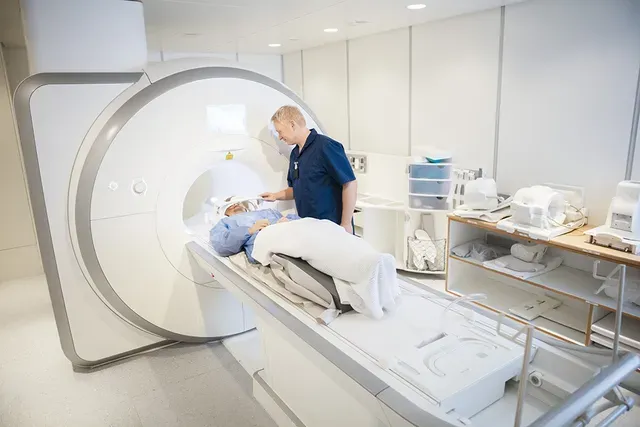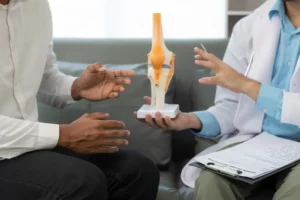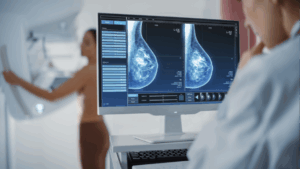An MRI (magnetic resonance imaging) uses a magnetic field to realign your body protons and radio waves to make a detailed picture of your body’s inside. It’s recommended when your injury cannot be captured through ultrasound, x-ray or CT scan.
An MRI (magnetic resonance imaging) uses a magnetic field to realign your body protons and radio waves to make a detailed picture of your body’s inside. It’s recommended when your injury cannot be captured through ultrasound, x-ray or CT scan. An MRI provides clear images of:
- Soft Tissues
- Joint Problems
- Tumours in the breast or kidneys
- Heart problem
- Brain injury
MRI is nothing like operating or opening your body to get your body scanned; it’s a simple imaging procedure like a CT scan and x-ray.
What Happens During An MRI?
Lying still in a tube that makes loud noises isn’t an easy job. However, it isn’t as scary as it sounds!
- After completing the hospital requirements and questionnaire, you may be given a contrast dye through IV before the procedure.
- During the MRI scan, you will be lying on a bed inside the MRI scanner. A coil will be placed over the part of your body being scanned to help produce images.
- Each scan can take from 3 seconds to 4 minutes, depending upon the images taken and the body part. After the scan, you will be free to go. However, if you had a sedative before the procedure, you will need somebody to drive you home.
That’s it! There is nothing like taking precautions 24 hours before or after the MRI scan.
How Long Does An MRI Take?
According to National Health Service, most MRIs take between 15 to 90 minutes to complete. However, some other factors can shorten or lengthen the duration.
Factors That Affect The MRI Time
Following factors play an essential role in determining the MRI Time:
- The Number of Images That Need to Be Taken: If it’s necessary to take more detailed images, your MRI will take longer than a simple scan. Each image takes 3 to 4 seconds to record; increasing number of images will result in increased MRI time!
- Part of the Body That Needs to Be Scanned: There is a simple rule; the larger the area to be monitored, the longer the MRI will take.
- Contrast Dye: In some cases, contrast dye is injected to help small tissue appear clearer in the images. A contrasting agent such as Gadolinium illuminates upon scanning and helps radiologists take a better look at your body parts. MRIs that need contrast dye can take an additional 15 to 20 minutes to complete.
Let’s take a look at how long does each type of MRI take!
How Long Does A Brain MRI Take?
An MRI of the brain helps identify the issues and conditions that affect your brain health. It depends on whether you are getting a limited brain MRI or not. A limited brain MRI typically takes 5 to 10 minutes; whereas, a whole-brain MRI can take 30 to 60 minutes.
A brain MRI allows one to take a closer look at the brain and surrounding tissues. It helps evaluate:
- Stroke
- Brain internal bleeding
- Brain Tumour
- Brain abscess
How Long Does A Breast MRI Take?
A breast MRI typically takes 45 minutes to complete. In some cases, patients need to be injected contrast dye into their arm before the MRI. In the case of injected contrast dye, the MRI can take up to 90 minutes. However, we at One Step Diagnostic provide Accelerated Breast MRI, which only takes 15 to 20 minutes to complete.
During the breast MRI, the provider takes a closer look at breast tissues without using radiations. Your provider can detect if you have breast cancer, breast lump, or you have slow blood flow in your breasts.
How Long Does A Cervical MRI Take?
A cervical spine MRI typically takes 30 to 45 minutes, but it can be as quick as 20 minutes. This MRI helps generate a clear picture of the spine and detect the following issues:
- Injury in the spin
- Trauma in the spine
- Scoliosis
- Arthritis in the spine
How Long Does A Knee MRI Take?
Torn tendons and ligaments or knee bone fracture are the possible reasons that you need a knee MRI. We at One Step Diagnostic perform knee MRI by putting small devices containing coils around your knee; these dives help produce a clearer image. A knee MRI helps the provider determine if you have:
- Arthritis damage
- Bone fracture
- Knee swelling
- Knee injury
How Long Does A Lumbar Spine MRI Take?
A lumbar spine MRI takes up to 15 to 20 minutes, but if contrast dye is involved, then it may take 30 to 60 minutes to complete. A lumbar spine MRI can help identify causes of back pain such as:
- Birth defects
- Disk herniation
- Injury in the spine
How Long Does A Cardiac MRI Take?
Cardiac MRI involves taking a look into your heart conditions. A cardiac MRI usually takes 90 minutes to complete as it involves taking detailed images of the heart surrounding. This MRI helps identify if you are suffering from conditions that may lead to heart failure.
Why Does An MRI Take So Long?
During an MRI procedure, hundreds of images are recorded from multiple angles and several directions and then pieced together. Many patients feel a shiver in their spine at the thought of spending half an hour or more in an enclosed tube; there is nothing to worry about. It’s a painless procedure that doesn’t involve any radiations. Every single image takes 3 to 4 seconds to records; that’s why an MRI takes so long to complete.
When Will I Have The Results Of An MRI?
The amount of time it takes to get your MRI results depends upon the seriousness of your condition. Generally, it takes one week to get results. However, the process can be quicker if you have a health condition that requires urgent diagnosis and treatment.
Most of the types of MRI usually complete within 15 to 90 minutes. However, in some cases, your doctor may inject a contrasting agent such as Gadolinium; this agent lightens up when scanned and helps the radiologists take a better and clearer look at your brain, heart or tissues. In the case of contrast dye through IV, it may take an additional 20 minutes! The duration of the procedure can be shorter or longer depending upon certain factors. There is no one-fits-all answer!




